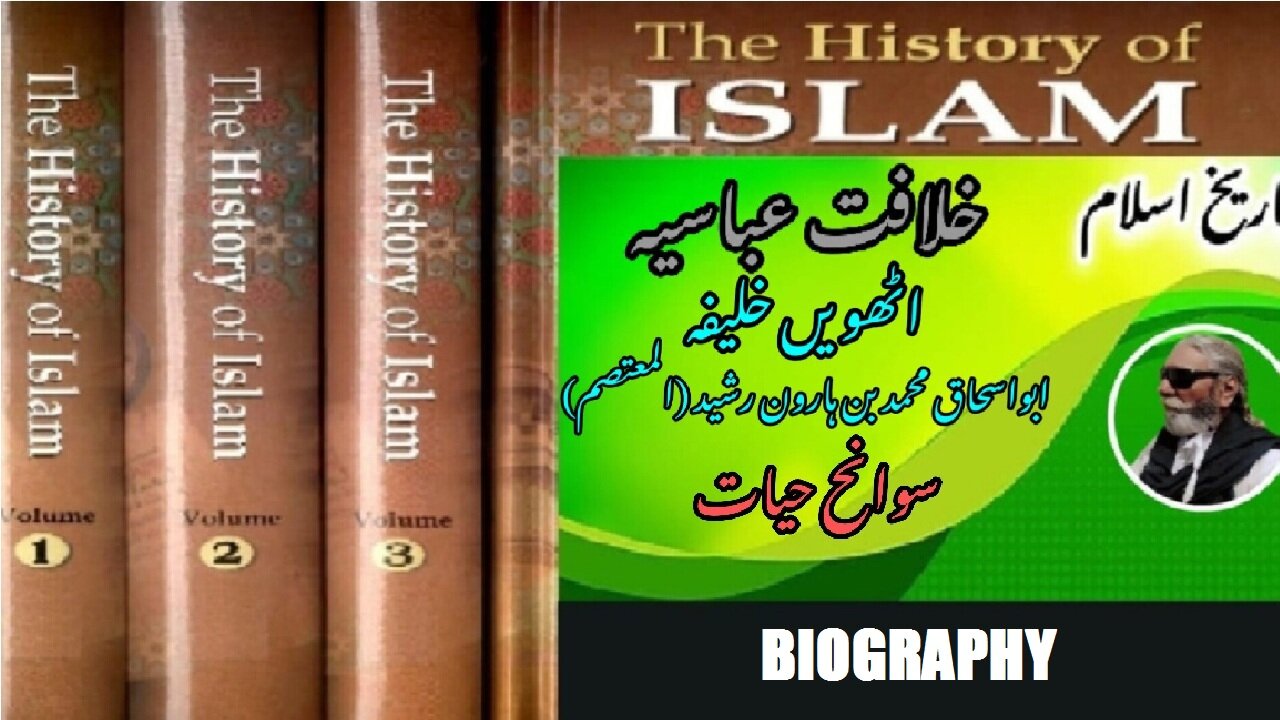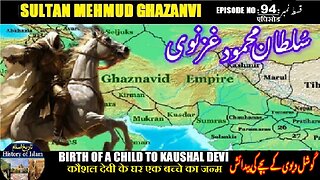Premium Only Content

8th Caliph of Abbasid Caliphate Abu Ishaq Muhammad ibn Harun al-Rashid (Al-Mutasim)
@islamichistory813 #islamiccaliphate #8thcaliph #abbasidcaliphate #almutasimbiography #goldenageofislam
8th Caliph of Abbasid Caliphate Abu Ishaq Muhammad ibn Harun al-Rashid (Al-Mutasim)
Asslamoalaikum sisters brothers firends and elders, we are discribing biography of 8th caliph of Abbasid Claiphate of Ab? Is??q Mu?ammad ibn H?r?n al-Rash?d, an influential historical figure in Islamic history. This enlightening biography delves into his significant contributions, achievements, and the impact he left on the world. Whether you're a history buff or just looking to expand your knowledge, this video offers a concise yet comprehensive overview that will enrich your understanding. Don't miss this chance to explore the fascinating story of Ab? Is??q Mu?ammad ibn H?r?n al-Rash?d.
Al-Mutasim, was born in the Khuld ("Eternity") Palace in Baghdad, but the exact date is unclear: according to the historian al-Tabari (839–923), his birth was placed by authorities either in Sha'ban AH 180 (October 796 CE), or in AH 179 (Spring 796 CE or earlier).[2][a] His parents were the fifth Abbasid caliph, Harun al-Rashid (r.?786–809), and Marida bint Shabib (a slave concubine. Marida was born in Kufa, but her family hailed from Soghdia, and she is usually considered to have been of Turkic origin.
The young prince's early life coincided with what, in the judgment of posterity, was the golden age of the Abbasid Caliphate. The abrupt downfall of the powerful Barmakid family, which had dominated government during the previous decades, in 803 hinted at political instability at the highest levels of the court, while provincial rebellions that were suppressed with difficulty provided warning signals about the dynasty's hold over the empire. Nevertheless, compared to the strife and division that followed in the decades after Harun's death, the Abbasid empire was living through its halcyon days. Harun still ruled directly over the bulk of the Islamic world of his time, from Central Asia and Sind in the east to the Maghreb in the west. Lively trade networks linking Tang China and the Indian Ocean with Europe and Africa passed through the caliphate, with Baghdad at their nexus, bringing immense prosperity. The revenues of the provinces kept the treasury full, allowing Harun to launch huge expeditions against the Byzantine Empire and engage in vigorous diplomacy, his envoys arriving even at the distant court of Charlemagne. This wealth also allowed considerable patronage: charitable endowments to the Muslim holy cities of Mecca and Medina and the welcoming of religious scholars and ascetics at court secured the benevolence of the religious classes towards the dynasty, while the funds lavished on poets guaranteed its lasting fame; the splendour of the caliphal court provided the inspiration for some of the earliest stories of the One Thousand and One Nights.
As one of Harun's younger sons, Abu Ishaq was initially of little consequence, and did not figure in the line of succession.[12] Soon after Harun died in 809, a vicious civil war broke out between his elder half-brothers al-Amin (r.?809–813) and al-Ma'mun (r.?813–833). Al-Amin enjoyed the backing of the traditional Abbasid elites in Baghdad (the abn?? al-dawla), while al-Ma'mun was supported by other sections of the abn??. Al-Ma'mun emerged victorious in 813 with the surrender of Baghdad after a long siege and the death of al-Amin.[13][14] Choosing to remain in his stronghold in Khurasan, on the northeastern periphery of the Islamic world, al-Ma'mun allowed his main lieutenants to rule in his stead in Iraq. This resulted in a wave of antipathy towards al-Ma'mun and his "Persian" lieutenants, both among the Abbasid elites in Baghdad and generally in the western regions of the Caliphate, culminating in the nomination of Harun al-Rashid's younger brother Ibrahim as anti-caliph at Baghdad in 817. This event made al-Ma'mun realise his inability to rule from afar; bowing to popular reaction, he dismissed or executed his closest lieutenants, and returned in person to Baghdad in 819 to begin the difficult task of rebuilding the state.
Throughout the conflict and its aftermath, Abu Ishaq remained in Baghdad. Al-Tabari records that Abu Ishaq led the Hajj pilgrimage in 816, accompanied by many troops and officials, among whom was Hamdawayh ibn Ali ibn Isa ibn Mahan, who had just been appointed to the governorship of the Yemen and was on his way there. During his stay in Mecca, his troops defeated and captured a pro-Alid[c] leader who had raided the pilgrim caravans. He also led the pilgrimage the following year, but no details are known. It appears that at least during this time, Abu Ishaq was loyal to al-Ma'mun and his viceroy in Iraq, al-Hasan ibn Sahl, but, like most members of the dynasty and the abn?? of Baghdad, in 817–819 he supported his half-uncle Ibrahim against al-Mamun.
Allah Hafiz
============================================
-
 5:12
5:12
ISLAMIC HISTORY
12 hours agoSultan Mehmud Ghazanvi Episode-94 Kaushal Devi कौशल देवी ने जन्म दिया کوشل دیوی کے ہاں بچے کی پیدائش
131 -
 1:18:03
1:18:03
Kim Iversen
2 hours agoCIA Launches YouTube Video Ads to Recruit Chinese Spies | The Birthrate Crash: Why Women Aren’t Having Kids
43.4K17 -
 1:35:12
1:35:12
Redacted News
3 hours agoHUGE! TRUMP FIRES NEO-CON MIKE WALTZ, PUTIN PRAISES TRUMP FOR MINERALS DEAL | Redacted News
85.4K63 -
 1:32:39
1:32:39
Dr. Drew
5 hours agoDana Loesch: Insane Texas Law Threatens To JAIL Political Meme Posters & Criminalize Parody (Up To A YEAR In Jail) w/ David Zweig – Ask Dr. Drew
15.9K5 -
 53:13
53:13
Kimberly Guilfoyle
4 hours agoIt's a Bad Day To Be a Bad Guy, More Wins for Kash's FBI | Ep218
37.4K8 -
 1:34:38
1:34:38
vivafrei
8 hours agoCanadian Election HANGOVER! You Got Fooled, Folks! Kamala Continues Cackling! Stephen Miller ROCKS!
85.5K77 -
 22:04
22:04
James Klüg
3 hours agoJames Klug and Billboard Chris Take On Antifa
29.7K7 -
 16:58
16:58
T-SPLY
4 hours agoDems’ Bad News: El Salvador Rejects Abrego, Democrats Fume!
20.4K21 -
 2:10:52
2:10:52
The Quartering
7 hours agoKarmelo Anthony SPENDING SPREE, Kamala Harris Hammered Drunk, Catturd Blasts Rumble & Superman Woke
158K53 -
 LIVE
LIVE
StoneMountain64
5 hours agoArc Raiders is my most ANTICIPATED game of the year now
162 watching